第七--when-while-as-区别及练习
高中英语--状语从句专题讲解(详细)
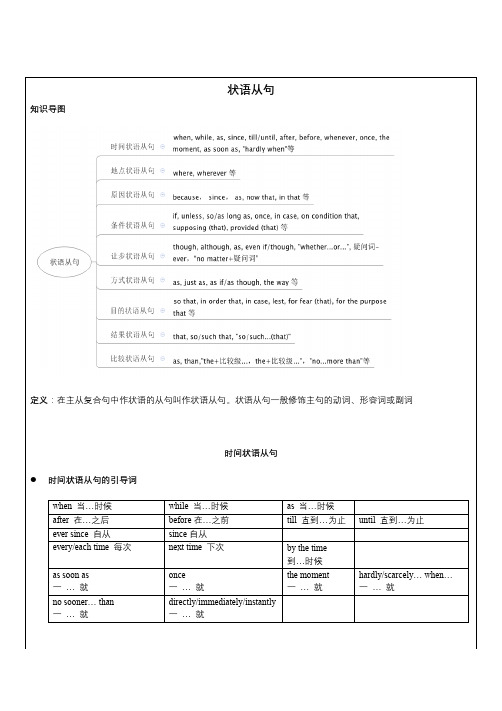
注:
“no sooner…than…”,“hardly…when…”引导时间状语从句时,主句用过去完成时,从句用一般过去时。此外,当把no sooner, hardly/scarcely提到句首时,主句用部分倒装。
as意为“随着,一边…,一边…”,常有以下用法:
a)用于表示两个动作同时或者几乎同时发生。
b)表示两个发展变化中的情况。
c)表示在某事发生的过程中另外一件事发生。
d)表示随着短暂动作的发生,另一动作立刻发生。
before和after引导的时间状语从句
before意为“在…之前”,表示主句动作发生在从句动作之前。
=I hardly told him the news when he stopped listening.
地点状语从句
地点状语从句的引导词有when和wherever。
where, wherever指具体地点时,从句可用于主句之前或之后;
where, wherever表示抽象概念的含义时,从句需放在主句前。
When hehad finishedhis homework, hetooka short rest.(先发生+后发生)
When Igotto the airport, the guesthad left.(后发生+先发生)
注:
when还可表示原因,意为“既然”,引导原因状语从句;也可以用作并列连词,意为“就在那时”,常构成如下结构:
A number of high buildings have arisen where there was nothing a year ago but ruins.(where表示具体地点)
英语时间状语从句讲解与练习(完整版)
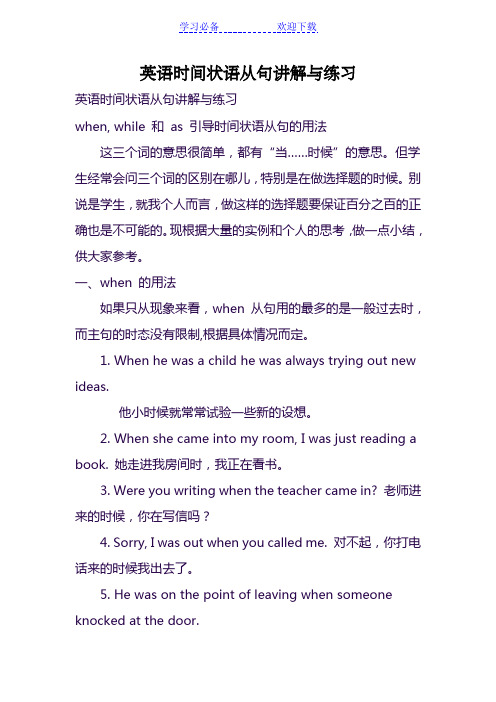
英语时间状语从句讲解与练习英语时间状语从句讲解与练习when, while 和as 引导时间状语从句的用法这三个词的意思很简单,都有“当……时候”的意思。
但学生经常会问三个词的区别在哪儿,特别是在做选择题的时候。
别说是学生,就我个人而言,做这样的选择题要保证百分之百的正确也是不可能的。
现根据大量的实例和个人的思考,做一点小结,供大家参考。
一、when 的用法如果只从现象来看,when 从句用的最多的是一般过去时,而主句的时态没有限制,根据具体情况而定。
1. When he was a child he was always trying out new ideas.他小时候就常常试验一些新的设想。
2. When she came into my room, I was just reading a book. 她走进我房间时,我正在看书。
3. Were you writing when the teacher came in? 老师进来的时候,你在写信吗?4. Sorry, I was out when you called me. 对不起,你打电话来的时候我出去了。
5. He was on the point of leaving when someone knocked at the door.他正要走,这时有人敲门。
6. I thought of it just when you opened your mouth. 就在你要说话的时候,我也想到了。
7. I had hardly[scarcely] closed my eyes when someone knocked at the door.我刚一闭上眼,就有人在敲门了。
根据以上的例句,我们可以总结出一点:when 从句的A 事件,相当于另一个事件B发生的时间点。
也就是说,when 从句的重点不在动作本身发生的状态,而只是把它作为一个时间点,所以when 多数情况下用的是一般过去时,则不用正在进行时。
when-和while的用法区别学习资料

w h e n-和w h i l e的用法区别when 和while的用法区别①when是at or during the time that, 既指时间点,也可指一段时间;while是during the time that,只指一段时间,因此when引导的时间状语从句中的动词可以是终止性动词,也可以是延续性动词,而while从句中的动词必须是延续性动词。
②when 说明从句的动作和主句的动作可以是同时,也可以是先后发生;while 则强调主句的动作在从句动作的发生的过程中或主从句两个动作同时发生。
③由when引导的时间状语从句,主句用过去进行时,从句应用一般过去时;如果从句和主句的动作同时发生,两句都用过去进行时的时候,多用while引导,如:a. When the teacher came in, we were talking.当此句改变主从句的位置时,则为:While we were talking, the teacher came in.b. They were singing while we were dancing.④when和while 还可作并列连词。
when表示“在那时”;while表示“而,却”,表对照关系。
如:a. The children were running to move the bag of rice when they heard the sound of a motor bike.孩子们正要跑过去搬开那袋米,这时他们听到了摩托车的声音。
b. He is strong while his brother is weak.他长得很结实,而他弟弟却很瘦弱。
when,while,as引导时间状语从句的区别when,while,as显然都可以引导时间状语从句,但用法区别非常大。
一、when可以和延续性动词连用,也可以和短暂性动词连用;而while和as只能和延续性动词连用。
【精品文档】when和while引导时间状语从句的区别及用法-word范文模板 (5页)
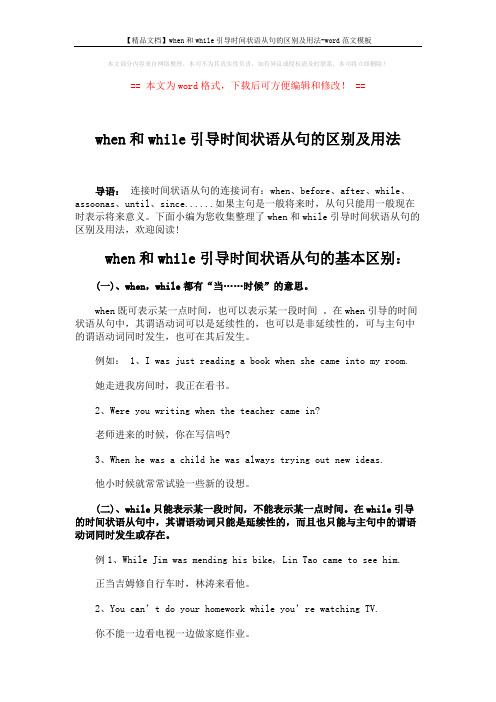
本文部分内容来自网络整理,本司不为其真实性负责,如有异议或侵权请及时联系,本司将立即删除!== 本文为word格式,下载后可方便编辑和修改! == when和while引导时间状语从句的区别及用法导语:连接时间状语从句的连接词有:when、before、after、while、assoonas、until、since......如果主句是一般将来时,从句只能用一般现在时表示将来意义。
下面小编为您收集整理了when和while引导时间状语从句的区别及用法,欢迎阅读!when和while引导时间状语从句的基本区别:(一)、when,while都有“当……时候”的意思。
when既可表示某一点时间,也可以表示某一段时间。
在when引导的时间状语从句中,其谓语动词可以是延续性的,也可以是非延续性的,可与主句中的谓语动词同时发生,也可在其后发生。
例如: 1、I was just reading a book when she came into my room.她走进我房间时,我正在看书。
2、Were you writing when the teacher came in?老师进来的时候,你在写信吗?3、When he was a child he was always trying out new ideas.他小时候就常常试验一些新的设想。
(二)、while只能表示某一段时间,不能表示某一点时间。
在while引导的时间状语从句中,其谓语动词只能是延续性的,而且也只能与主句中的谓语动词同时发生或存在。
例1、While Jim was mending his bike, Lin Tao came to see him.正当吉姆修自行车时,林涛来看他。
2、You can’t do your homework while you’re watching TV.你不能一边看电视一边做家庭作业。
(三)、另外,when和while的区别还在于:while引导的时间状语从句多用进行时态,而when引导的时间状语从句多用一般时态。
when, while, as soon as 用法
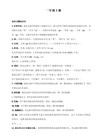
When, while, as, before, after, until的用法(1)、同时性两个事件的发生在时间上没有先后之分,或者说没有明显的先后之分,这就是我们在这里所讲的同时性(Same Time)。
这里有以下几种情况:a: 两个同时发生的事件,如果不是一次性而是重复性,即过去或现在的连贯动作,连词可用when,whenever。
例如:when he goes to town, he (always) visits his aunt.She (always) felt ill when she ate oyster.这里的when 意为“每当…的时候”,相当于whenever:Whenever he goes to town, he visits his aunt.She felt ill whenever she ate oyster.在上述两例中,不管是用when还是whenever,主句动词和时间状语分句动词或者都用一般现在时,或者都用一般过去时,分别表示现在或过去的习惯动作。
When/whenever的上述用法可以和if交替使用。
例如:If he go es to town, he brings us a present. = When/Whenever he goes to town….这里的if/when都表示whenever和every time的意思。
两个同时发生的事件,如果都用延续性,而且延续时间大致相等,连词可用when,while。
例如:The wind blew hard when the rain poured down.While I read, sha sang.在这里blew,poured,read,sang都表示持续性动作,前后都用一般过去时,有时也可以前后都有过去进行体。
比较:I was cooking the dinner while he was playing the piano. = I cooked the dinner while he played the piano.这两句意义基本相同,只是用过去进行体更加突出事件的持续性。
高中英语新高考语法基础版一轮复习讲义(15)时间状语从句中when、while、as用法知识点整理总结
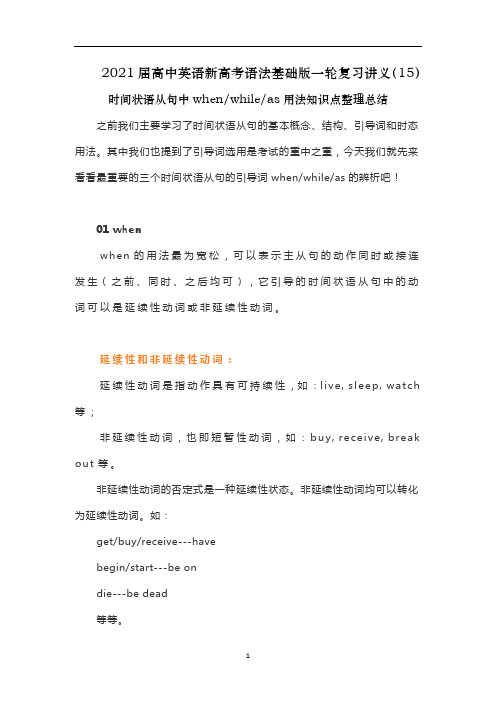
2021届高中英语新高考语法基础版一轮复习讲义(15)时间状语从句中when/while/as用法知识点整理总结之前我们主要学习了时间状语从句的基本概念、结构、引导词和时态用法。
其中我们也提到了引导词选用是考试的重中之重,今天我们就先来看看最重要的三个时间状语从句的引导词when/while/as的辨析吧!01 whenw h e n的用法最为宽松,可以表示主从句的动作同时或接连发生(之前、同时、之后均可),它引导的时间状语从句中的动词可以是延续性动词或非延续性动词。
延续性和非延续性动词:延续性动词是指动作具有可持续性,如:l i v e, sl e e p, wa t ch 等;非延续性动词,也即短暂性动词,如:b u y, re ce i v e, b re a k o u t等。
非延续性动词的否定式是一种延续性状态。
非延续性动词均可以转化为延续性动词。
如:get/buy/receive---havebegin/start---be ondie---be dead等等。
注意:当when的主从句时间关系符合两个过去的特征时,主句要用过去完成时,如:The guests had left when Tom arrived at the party.当Tom去赴宴时,客人们已经走光了。
从句时态问题可以阅读我之前的一篇文章(链接如下):从句时态问题when引导的时间状语从句的主从句可能有以下四种组合:a. 主句延续性、从句非延续。
b. 主句延续性、从句延续性。
c. 主句非延续,从句非延续。
d. 主句非延续,从句延续性。
请大家为下面的句子标注abcd:I lived in a small village when I was a little boy.当我是小孩时,我住在一个小村庄。
I used to catch frogs when I lived in a small village.当我住在小村庄时,我常常去抓青蛙。
when,while和as引导时间状语从句的用法
when, while 和as 引导时间状语从句的用法一、when 的用法如果只从现象来看,when 从句用的最多的是一般过去时,而主句的时态没有限制,根据具体情况而定。
1. When he was a child he was always trying out new ideas.他小时候就常常试验一些新的设想。
2. When she came into my room, I was just reading a book. 她走进我房间时,我正在看书。
3. Were you writing when the teacher came in? 老师进来的时候,你在写信吗?4. Sorry, I was out when you called me. 对不起,你打电话来的时候我出去了。
5. He was on the point of leaving when someone knocked at the door.他正要走,这时有人敲门。
6. I thought of it just when you opened your mouth. 就在你要说话的时候,我也想到了。
7. I had hardly[scarcely] closed my eyes when someone knocked at the door.我刚一闭上眼,就有人在敲门了。
根据以上的例句,我们可以总结出一点:when 从句的A事件,相当于另一个事件B发生的时间点。
也就是说,when 从句的重点不在动作本身发生的状态,而只是把它作为一个时间点,所以when 多数情况下用的是一般过去时,则不用正在进行时。
因为如果用正在进行时,它表示的就是一段时间而不是一个时间点了。
根据这一点,有的文章补充说:when 从句的动词大多是瞬时动词。
这种说法也可以参照。
实际上,when 从句也可以有其它的时态,但几乎也不用进行时,因为它也只是作为一个时间参照点。
过去进行时中“when和while讲解与练习
过去进行时中“when和while讲解与练习过去进行时表示过去某一时刻或者某段时间正在进行或发生的动作,常和表过去的时间状语连用,如:1. I was doing my homework at this time yesterday.昨天的这个时候我正在做作业。
2. They were waiting for you yesterday.他们昨天一直在等你。
3. He was cooking in the kitchen at 12 o'clock yesterday.昨天12点,他正在厨房烧饭。
过去进行时的构成:肯定形式:主语+was/were+ V-ing否定形式:主语+was not (wasn't)/were not (weren't)+V-ing疑问形式:Was/Were+主语+V-ing。
基本用法:1. 过去进行时表示过去某一段时间或某一时刻正在进行的动作。
常与之连用的时间状语有,at that time/moment, (at) this time yesterday (last night/Sunday/week…), at+点钟+yesterda y (last night / Sunday…),when sb. did sth.等时间状语从句,如:1)What were you doing at 7p.m. yesterday?昨天晚上七点你在干什么?2)I first met Mary three years ago. She was working at a radio shop at the time.我第一次遇到玛丽是在三年前,当时她在一家无线电商店工作。
3)I was cooking when she knocked at the door.她敲门时我正在做饭。
2.when后通常用表示暂短性动词,while后通常用表示持续性动词,而while所引导的状语从句中,谓语动词常用进行时态,如:When the car exploded I was walking past it. = While I was walking past the car it exploded.3.when用作并列连词时,主句常用进行时态,从句则用一般过去时,表示主句动作发生的过程中,另一个意想不到的动作发生了。
8B过去进行时when,as和while的区别
• ②when 说明从句的动作和主句的动作可以是同 时,也可以是先后发生;while 则强调主句的动 作在从句动作的发生的过程中或主从句两个动作 同时发生。
• ③由一般过去时;如果从句和主句的动作同时发生,两 句都用过去进行时的时候,多用while引导,如:
while连接的句子,后面必须用进行时(现在/ 过去进行时)
1) A car hit her while she was thinking about a question.
2) The books fell off from the shelf while they were listening to the radio.
while表示“而,却”,表对照关系。如: • a. The children were running to move the bag of rice
when they heard the sound of a motor bike. • 孩子们正要跑过去搬开那袋米,这时他们听到了摩托车的
声音。 • b. He is strong while his brother is weak. • 他长得很结实,而他弟弟却很瘦弱。
3) While we are playing football, a noise comes from downstairs.
小结:用while 和when 填空,看看它们后面的句 子的时态。如果是过去时,必须用when. 如果是进 行时,必须用while(没有while选项的时候用 when)
小结:在作“当…时候”时,when可以替换 while.
时间状语从句讲解及练习题
时间状语从句when, while 和 as 引导时间状语从句的用法一、when 的用法如果只从现象来看,when 从句用的最多的是一般过去时,而主句的时态没有限制,根据具体情况而定。
1. When he was a child he was always trying out new ideas.他小时候就常常试验一些新的设想。
2. When she came into my room, I was just reading a book. 她走进我房间时,我正在看书。
3. Were you writing when the teacher came in? 老师进来的时候,你在写信吗?4. Sorry, I was out when you called me. 对不起,你打电话来的时候我出去了。
5. He was on the point of leaving when someone knocked at the door.他正要走,这时有人敲门。
when 从句的A事件,相当于另一个事件B发生的时间点。
也就是说,when 从句的重点不在动作本身发生的状态,而只是把它作为一个时间点,所以when 多数情况下用的是一般过去时,则不用正在进行时。
因为如果用正在进行时,它表示的就是一段时间而不是一个时间点了。
根据这一点,有的文章补充说:when 从句的动词大多是瞬时动词。
实际上,when 从句也可以有其它的时态,但几乎也不用进行时,因为它也只是作为一个时间参照点。
例如:1. When I got to the airport, the guests had left. 当我赶到飞机场时,客人们已经离开了。
By the time2. When he had finished his homework, he took a short rest.当他完成作业后,他休息了一会儿。
3. I’ll talk with the manager about this when he comes here for a visit next week, . 下周,经理来这参观时,我会和他谈谈此事。
- 1、下载文档前请自行甄别文档内容的完整性,平台不提供额外的编辑、内容补充、找答案等附加服务。
- 2、"仅部分预览"的文档,不可在线预览部分如存在完整性等问题,可反馈申请退款(可完整预览的文档不适用该条件!)。
- 3、如文档侵犯您的权益,请联系客服反馈,我们会尽快为您处理(人工客服工作时间:9:00-18:30)。
When while as区别 一.用所给动词正确行使填空 1. I _____ (have) my breakfast at half past six yesterday morning. 2. Mary _____ (go) over her lessons from six to seven last night. John and peter ____(do) the same thing. 3. What _____ you ___ (do) at that time? We _____ (watch) TV. 4. Was your father at home yesterday evening? Yes ,he was. He _____ (listen) to the radio. 5. They _____(not make) a model ship when I saw him. 6. _____ they ____ (have) a meeting at 4 yesterday afternoon? No, they _____. They _____ (clean) the classroom. 7. ______ it ______(rain) when you left school? Yes, it ____. (No, it ____) 8. What _____ your father _____ (do) when he was your age? 9. One day, Edison _____ (wait) for a train to arrive, and suddenly a little boy ran to the track(轨道) to play. 10. He asked me if I ______ (go) fishing that afternoon. 11. The three of them were in a hurry because their plane _____ (leave) in five minutes. 12. In a letter, john told us that he _____ (come) to china next month. 13. When the bell rang, jenny _____ (wait) in her seat. 14. She _____ (make) her dress the whole afternoon. 15. While my father ____ (look) through the evening paper, he suddenly ____ a cry. 16. When I ____ (come) in the room, he ____ (see) me, for he ____ (read) something 17. When we _____ (arrive) at the village, it _____ (get) dark and it _____ (rain) hard. 18. I _____ (know) you ____(wait) for me here. 19. We had no classed at that time. We ____ (plant) trees. 20. What ____ your father ____ (do) yesterday evening? He ____ (study) at the evening school. 21. Later his parents found that he _____ (sit) on some eggs. 22. When he knocked at the door, my aunt ____ (cook) 23. The students ______ (sing) and ____ (dance) happily on the playground at that time. 24. I ____ (write) a letter when the door bell rang. 二.改错 1. She is fat but I am thin. 2. It was raining while we arrived. 3. She sang while he walked. 三. 选择最佳答案 1.She thought I was praising her child,_____,in fact,I was scolding him for his bad behaviors at school. A. what B. while C. so that D. therefore 2.I do every single bit of housework ____ my husband Bob just does the dishes now and then. A. while B. since C. when D. as 3.We were swimming in the lake ___ suddenly the storm started. A. when B. while C. until D. before 四.填空:when while 1.______ Margo was talking on the phone, her sister walked in. 2.______ we visited the school, the children were playing games. 3. ______ Linda shouted his name, some people looked at her. 4.______ I saw Carlos, he was wearing a green shirt. 5.______ Allen was cleaning his room,the phone rang. 6.______ Rita bought her new dog,it was wearing a little coat. 7. He was driving along ________ suddenly a woman appeared. 8. _____ Jake was waiting at the door, an old woman called to him. 9. He was reading a book ______suddenly the telephone rang. 10. ______ it began to rain, they were playing chess. 11. She saw a taxi coming ______ the woman was waiting under the streetlight. 12. ______ the allien was in the museum,I called the police. 13. The boy was walking down the street ______ a UFO landed. 14. ______ the alien was visiting the museum,the boy called the TV station. 15. I was cleaning my room ______ the fire broke out. 16. My wallet dropped on the ground _______ I was running. 17. __________ I was falling asleep, there was a loud knock on the door. 18. __________ he was reading, an earthquake started. 19. Were the students listening to the teacher carefully __________the teacher was giving a lesson? 20. __________ the telephone rang, I became nervous.
完型填空 In the south-east of Guizhou,there is a small city—Kaili,I was born there.Today,I am 1 you about my hometown.Kaili is not far from Guiyang.It’s about two 2 kilometres away from Kaili to Guiyang.Kaili is a small city.There aren’t many tall buildings in it.Most of us live in flats.We like to live in the flats 3 we can be close to our friends.In the centre of Kaili,there is fl big supermarket.You can 4 some nice things here.Things in the supermarket aren’t expensive,so you can 5 a little money for them and they are yours.My hometown is a beautiful city.On each side of the 6 ,there are big trees and nice flowers.The roads are also very clean. 7 make people happy and comfortable.The 8 here are very nice.I like autumn best.It’s neither too hot nor too cold. Kaili is a good place to travel.You can see the 9 Miao Village--Xijiang in the world.You can swim in the Bala River.You can 10 delicious sour soup fish.Welcome to my hometown. 1.A.saying B.speaking C.talking D.telling 2.A.hundred B.thousand C.million D.billion 3.A.but B.though C.because D.however 4.A.borrow B.buy C.give D.rent(租) 5.A.spend B.pay C.cost D.take 6.A.rivers B.parks C.houses D.roads 7.A.They B.I C.You D.It 8.A.months B.years C.seasons D.weeks 9.A.biggest B.smallest C.tallest D.youngest 10.A.sound B.taste C.look D.keep
